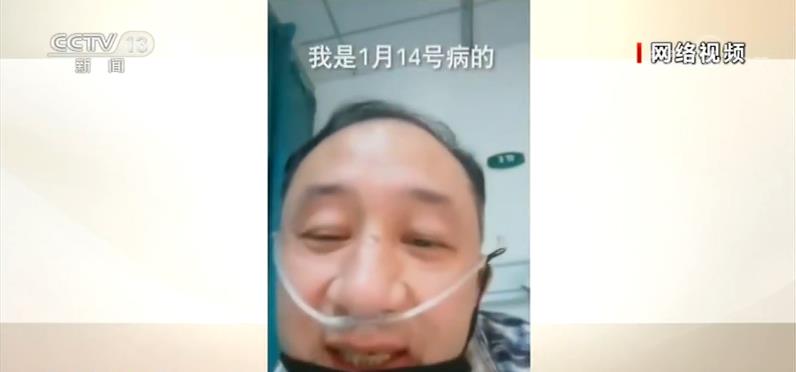An infected physician's fight against COVID-19 in Wuhan
- By Zhu Bochen
 0 Comment(s)
0 Comment(s) Print
Print E-mail China.org.cn, February 13, 2020
E-mail China.org.cn, February 13, 2020

Yu Changping, associate chief physician at the Department of Respiratory and Critical Care Medicine in Renmin Hospital of Wuhan University, shared with the public through brief video clips his personal experience after being infected with the COVID-19 virus earlier this January.
"When did I get infected? And Who infected me? It's very difficult to answer these questions," said Yu. "I had been in close contact with many patients and worked on the frontline, thus, getting infected does happen."
According to Yu, he first developed the symptom of fever with a temperature of 38.5 degrees Celsius on Jan. 14. As his department was to have a new year's dinner on Jan. 17, Yu still hadn't begun to feel better and was wondering if he had been infected. He then asked for a CT scan and found that he had double pneumonia. That was when he was hospitalized.
"I didn't develop any other symptoms except for fever in the first two or three days after being hospitalized," Yu said. However, another CT scan showed exacerbation in both of his lungs, causing him to comment: "This is not surprising."
He was soon in critical condition. He couldn't get out of bed in the following four to five days and developed shortness of breath and chest tightness. Still, based on his professional background as a respiratory specialist, Yu knew that, as long as he made through these critical moments, it was very likely he would recover.
"I believe there is a 70% chance that I will survive," Yu said in one of his video reports. "Because I was in good health, with a strong immune system before I get infected. Also, I eat a lot, and usually get enough rest."
After 15 days of medical treatment, on Jan. 29, the CT test results showed that Yu was finally in a stable condition.
Based on his clinical practice, Yu also talked about the diagnosis of COVID-19 at an early stage. According to him, viral pneumonia often happens when patients develop a symptom of fever, while their CT scan result shows pathological changes in both lungs.
Nevertheless, he also noted that the final diagnosis should be confirmed through a nucleic acid test.
In addition, Yu mentioned in his video that despite the increasing number of infections, many of the confirmed cases only developed mild symptoms, just like his wife who volunteered to take care of him when he was in critical situation and then became infected herself.
"Therefore, as we attach great importance to preventing and containing this virus, it is not necessary to panic," he stressed.
"For those who develop mild early symptoms, home quarantine is your first choice. But if your situation gets worse, you should go to hospital for medical treatment as soon as possible."
As for how the COVID-19 will evolve in the future, Yu was confident that the virus would be contained in the medium to long term as the weather warmed up.
"Don't panic when facing a serious disease, because medical staff like me will always pull you through," he promised.






Go to Forum >>0 Comment(s)